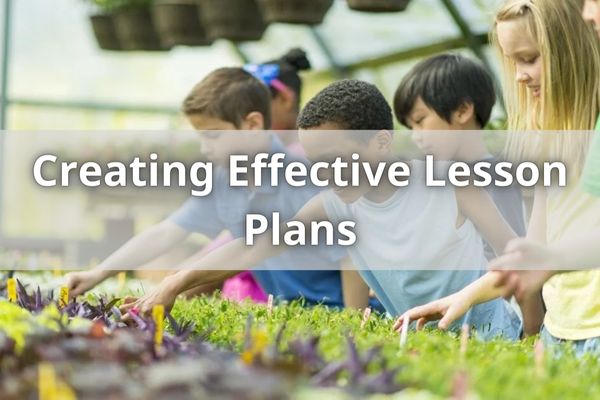Ag Teacher Jobs: Requirements, Salary, And Job Outlook
Becoming an agriculture teacher is a great way to combine your love of farming and teaching. It takes dedication, hard work, and knowledge of the agricultural industry to be successful in this career field. Whether you’re fresh out of college or looking for a new challenge later in life, ag teacher jobs offer plenty of opportunities for those who are passionate about cultivating their skills and sharing that knowledge with others.
Agriculture teachers have the unique opportunity to pass on their expertise to students interested in pursuing careers in farming, ranching, forestry, horticulture and more. Not only do these professionals get to share their passion for agriculture with future generations but they also help shape young minds into responsible citizens.
With so many benefits associated with being an ag teacher, it’s no wonder why there’s such high demand for qualified applicants!
Job Requirements
To become an agricultural teacher, there are certain requirements that need to be met. First and foremost is a degree in agriculture or related field such as agricultural economics or environmental stewardship.
It’s also important for candidates to have experience working with animals and plants in the classroom setting; this could include prior teaching experience within the subject area. Networking opportunities will help interested applicants stand out from the competition when applying for these jobs.
Having strong knowledge of agriculture-related topics like soil science, crop production, animal health, and business management is essential to succeeding as an ag teacher. In addition, many states require teachers to hold specialized certifications relevant to their classes, so it’s important for prospective teachers to think ahead about what type of certification they may want down the line and begin researching associated qualifications before job searching.
The ability to communicate effectively both orally and through written language is another key requirement for the position since ag teachers must often present lessons and offer instruction on complex subjects. They should also possess excellent organizational skills so they can plan curriculum in advance and focus on student learning outcomes throughout each lesson.
With all these considerations in mind, aspiring ag teachers should feel equipped to prepare themselves for success in their future role.
Salary Considerations
Job requirements for agricultural teachers vary depending on the district. Typically, candidates must have a bachelor’s degree in agriculture or related field and meet state certification requirements. They should also be knowledgeable about agricultural marketing strategies to maximize their students’ success.
Salary considerations vary by school district and depend on experience, education level, and region. Generally speaking, entry-level salaries are around $40K annually while experienced agricultural teachers can earn up to $65K per year. Additionally, some districts offer student loan repayment as an incentive for qualified applicants.
Potential opportunities exist for those interested in a career teaching agriculture. With proper training, certifications, and knowledge of marketing strategies, individuals may find rewarding positions that provide competitive wages and other job benefits such as student loan debt assistance.
Teachers who pursue these roles will help shape future generations of farmers and ranchers through experiential learning methods tailored to each individual student’s needs.
Potential Opportunities

The world of ag teacher jobs is an exciting one, and it can be overwhelming to dive into the job search process. Yet with the right plan and resources, you can make it a bit easier for yourself. Here are four key elements that will help you get started:
- Interview tips – Researching potential employers in advance, understanding common interview questions, practicing your responses out loud – these tips can all give you added confidence when interviewing for ag teaching positions.
- Networking strategies – Don’t underestimate the power of networking! Connecting with colleagues already working in agricultural education or other related fields is a great way to learn more about available opportunities and gain valuable insights from professionals who have been there before.
- Job search tactics- Utilize multiple outlets such as online job boards, career fairs, alumni networks and personal referrals to uncover new openings and expand your options.
- Professional development – Invest in yourself by taking courses or attending conferences dedicated to agriculture instruction topics; this could potentially lead to greater advancement opportunities within the field down the road.
Without question, having a firm grasp on each of these areas will put you light-years ahead of others going through the same process—so don’t hesitate to do your due diligence!
As we move forward exploring teaching basic farming techniques, keep these ideas close at hand as they may prove useful later on too!
Teaching Basic Farming Techniques
Having discussed potential opportunities, it is now necessary to turn our attention towards teaching basic farming techniques.
Sustainable farming practices are essential for the preservation of agricultural resources and ecosystems, while also promoting economic growth in rural communities. Therefore, classes should focus on sustainable crop production methods such as no-till agriculture and intercropping systems. Additionally, students need to be equipped with knowledge about hydroponic systems and alternative sources of energy used for modern agricultural operations.
Agricultural economics courses can provide insight into pricing strategies, market trends, and consumer behavior that have an impact on current agricultural markets. Furthermore, these classes can teach students how to make informed decisions when producing crops or livestock products through various cost management models. In this way, future farmers may be able to determine which investments will yield the highest returns before investing in labor or farm inputs.
Finally, while discussing animal husbandry and crop management skills is important; it is equally as crucial that ag teachers impart lessons regarding soil conservation and land stewardship within their classrooms.
The understanding of proper soil erosion control measures combined with a keen awareness of global climate change effects could help budding farmers protect natural resources over time through improved decision making processes related to the use of fertilizers and other chemicals throughout the growing season.
Animal Husbandry And Crop Management
Enriching our understanding of ag teacher jobs is crucial to helping sustain rural communities. Through sustainable farming practices and a strong grasp on agricultural economics, those in the field can make positive contributions that will benefit generations to come.
Ag teachers have an important role to play in educating students about these topics. They must understand the complexities of both crops and animal husbandry, as well as how modern technology has impacted agriculture production. These educators must be able to relate this knowledge to their students in meaningful ways so they gain a thorough appreciation for the value of sustainable farming practices.
In addition, ag teachers are expected to administer lessons related to food safety, biotechnology and soil sciences—all vital components of successful crop management strategies.
With their expertise, these professionals can help cultivate future leaders who may one day shape the direction of agriculture policy worldwide.
This brings us smoothly into discussing teaching classes focused on agriculture science and technology.
Teaching Classes Focused On Agriculture Science And Technology
Agriculture teachers have a responsibility to ensure that students understand the importance of fertilizer usage, soil conservation and water management. These are key topics in agricultural science and technology classes because they help protect the environment from harm caused by agribusiness operations.
In addition to teaching about these concepts, teachers must also demonstrate how each is implemented in real-world settings. They can do this through activities such as field trips or guest speakers who discuss their experience with sustainable agriculture practices.
Teachers must also be able to explain why certain regulations exist for fertilizer usage, soil conservation and water management. Through discussions with an emphasis on critical thinking skills, teachers can challenge students to see beyond what is being taught in the classroom and think critically about current issues within the industry. By doing so, students gain a comprehensive understanding of environmental concerns related to agribusiness operations and develop solutions which could benefit both farmers and consumers alike.
In-classroom instruction should focus on providing hands-on experiences which allow students to apply what they’ve learned about various aspects of agricultural science and technology. For example, having them design a plan for efficient irrigation systems or calculate optimal amounts of fertilizers needed for different crops will give them practical tools they can use when managing their own farms one day.
Such projects can be supplemented with outside readings that build upon core materials discussed throughout class sessions. With this combination of learning approaches, students become well versed in essential knowledge relating to all facets of farming today — setting them up for success in future endeavors related to agriculture sciences and technologies.
In-Classroom Instruction

Teaching classes focused on agriculture science and technology provides students with a unique opportunity to explore the profession they are interested in. Students learn about the different career paths available, as well as how their knowledge of agricultural economics can help them understand rural lifestyles.
It is important for teachers to provide up-to-date information on new technologies, practices, and ways of doing business that will impact modern agriculture. This helps encourage deeper learning opportunities by allowing students to research potential solutions and outcomes to current industry challenges.
In-classroom instruction should be tailored to promote student engagement while also supporting student learning outcomes. Using hands-on activities like field trips or guest speakers from local farms can bring topics alive in interesting ways, helping build connections between coursework and real world applications.
Teachers should create lesson plans that challenge students’ critical thinking skills by asking questions related to ethical considerations or environmental impacts when it comes to decisions made within the agricultural industry. By providing meaningful discussions around these topics, teachers can better equip their students with relevant knowledge necessary for success in this field.
Group projects such as developing a marketing plan for an imaginary product line incorporating sustainable practices may help introduce concepts related to agribusiness operations. Through collaborative tasks like these, students gain valuable experience working together as a team which could translate into successful careers later down the road.
To further enhance understanding of various aspects of agriculture science and technology, encouraging participation in competitions or presenting findings at conferences gives students additional platforms to showcase what they have learned through active application of core principles discussed in class.
Supporting Student Learning Outcomes
As an agricultural teacher, it is important to be aware of current industry trends and the impact these have on student learning outcomes.
Keeping abreast of community engagement activities in the field can provide a rich source of knowledge that can be used to help students understand how they fit into their local environment. Additionally, incorporating sustainability practices within lesson plans helps promote appreciation for nature as well as develop skills related to animal husbandry and crop management.
To ensure successful student outcomes, teachers need to create meaningful connections between classroom instruction and real-life scenarios. By actively engaging with industry professionals, participating in hands-on activities such as field trips or internships, and utilizing resources from local organizations or government agencies, teachers are able to strengthen the relevancy of their teaching materials while providing valuable opportunities for experiential learning.
In order for students to truly benefit from lessons learned in agriculture classrooms, teachers must strive for effective lesson plan design. This involves researching topics thoroughly, creating interactive tasks that stimulate critical thinking skills, and assessing progress regularly throughout the course duration.
With this approach towards curriculum development, educators will be better equipped to meet individual student needs and foster lifelong learning habits amongst young minds. Adopting a holistic approach then allows teachers to bridge theory with practice – setting up future generations for success.
Creating Effective Lesson Plans

Creating effective lesson plans is an essential part of teaching agricultural education. It’s important to plan content that will engage and motivate students. Content delivery should be balanced with hands-on activities and experiential learning opportunities for maximum effectiveness in the classroom.
When planning, teachers must consider their audience – what topics do they need to cover? What methods can be used to deliver these lessons most effectively? Incorporating hands-on activities into a lesson helps bring concepts alive for students, making them more engaged and interested in the material. Experiential learning allows students to experience something directly rather than just hearing about it from someone else. This approach often leads to greater understanding of the topic at hand as well as increased motivation among learners.
Strategies such as field trips or simulations are great ways to incorporate this kind of learning into your curriculum. Teachers should also take time to reflect on their own teaching style when creating lesson plans; how have you been successful in the past? How could you improve upon existing strategies? Knowing yourself and being open to trying new things can help you create engaging experiences for every student within your class.
With thoughtful planning, teachers can ensure that each lesson has a positive impact on student growth and achievement. Establishing strong relationships between teacher and student is key for success in any educational setting.
Establishing Positive Student/Teacher Relationships
As the lesson planning process comes to a close, establishing positive student/teacher relationships is key for successful learning in any classroom. Positive relationships result in mutual trust and respect between teacher and pupil, making it easier to foster an environment of growth.
As an ag teacher, there are several strategies you can use to develop these connections with your students. Group activities are one way to break down barriers and start building strong relationships. Incorporating outdoor learning into group projects is particularly effective; research has shown that this type of experiential education helps improve collaboration skills among participants.
Additionally, participating in career exploration activities such as internships or job shadowing opportunities allows students to get invaluable real-world experience while forging meaningful bonds with their teacher along the way. Teachers have the power to make a lasting impact on the lives of their pupils, so developing positive relationships is crucial.
By employing creative methods like group activities and outdoor learning exercises, ag teachers can create an environment where each individual feels valued and respected – setting up their students for success both inside and outside the classroom walls.
Conclusion
To become an ag teacher, you need to have the right qualifications and certification. You’ll also need experience in the field so that you can stay up-to-date with the latest developments in ag technology.
It’s a great career choice for those who want to make a difference in their community by teaching students about important agricultural concepts. Plus, there are plenty of additional benefits like competitive salaries, flexible hours, and job security.
With dedication and hard work, anyone can pursue a rewarding career as an ag teacher.







